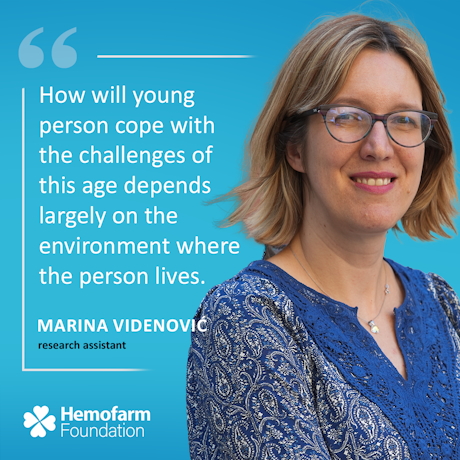
15/05/2024
IF GROWING UP WAS EASY, EVERYONE WOULD DO IT
Marina Videnović
research assistant at the Institute of Psychology of the Faculty of Philosophy in Belgrade
IF GROWING UP WAS EASY, EVERYONE WOULD DO IT
At the beginning of the 21st century, Geoffrey Arnett introduced the term emerging adulthood to emphasize the specifics of the period between adolescence and full adulthood, usually from late adolescence to the thirties. In other words, we don't become adult, boring people overnight, but we go through a period of transition, i.e. trying out, wandering and making uncertain first steps in the roles that await us.
In this period young people decide about their career path, have serious relationships, begin to live on their own, they become or plan to become parents. In any case it is a long list that is not easy to fulfil. This period may therefore be marked with challenges which lead to uncertainty, anxiety and stress. The pressure to make important life decisions can be overwhelming. All these changes in different spheres of life are often accompanied by turbulent internal questioning and dilemmas. Relationships with significant others, parents and peers are redefined.
How will young person cope with the challenges of this age depends largely on the environment where the person lives. Parent’s impact can be more or less supporting. The parents themselves undergo this challenging phase of „empty nest“. They need to adjust to a new situation in which they no longer have so much direct impact on their child's life, they have excess free time that needs to be fulfilled meaningfully, and they face their own aging. Unconsciously, some parents inhibit their children's independence because they cannot adapt to new challenges. We also often hear messages of intimidation that start with "You'll see when..." and the sentence goes on differently like "when you have to pay the bills, and they cut your electricity", "you have children of your own", "you have to get up early every day for work". In this way, young people are actually being sent an incorrect message that the life of an adult is only unpleasant, and does not bring with it the satisfaction of having gained freedom.
The world in which young people are growing up today is different. They are first generation that has lived in the world of Internet and social media since their birth. Twenge, who deals with generational differences, notes that there is a trend of postponing classic adult roles, such as separation from parents, marriage, buying a house and starting a family. In any case, young people face different challenges, but also greater opportunities.
In addition to parents, different expectations and cultural norms of the environment in which a young person lives can prevent them from boldly starting to create their own life during this period. Arnett states that the period of emerging adulthood is primarily associated with those environments that allow young people to experiment and try out new roles and options that can be taken. Young people, especially from marginalized backgrounds, sometimes decide to live a life similar to their parents because the fear of going into the unknown is too great.
It makes sense to assume that young people in Serbia encounter some additional obstacles compared to young people who live in stable systems. One of them is greater economic uncertainty, because young people face difficulties in finding a stable and adequately paid job. Also, the educational system does not sufficiently follow technological changes and does not prepare young people for the challenges they will encounter in the labour market. Finally, increased pressure, insecurity and socio-economic difficulties can negatively affect the mental health of young people. The lack of access to mental health care and the stigma surrounding mental illness further complicates the situation.
It is always modern to be concerned about the young people and the question where this world will end up with such successors has always been present. Comparisons are usually made that are based on romanticized and non-objective memories about how we were and how we acted when we were young. An effort should be made so that the society as a whole should get out of the pattern of criticism and hypocritical concern and provide systemic support to young people in their efforts to create a better world.

AUTHOR
Marina Videnović
research assistant at the Institute of Psychology of the Faculty of Philosophy in Belgrade